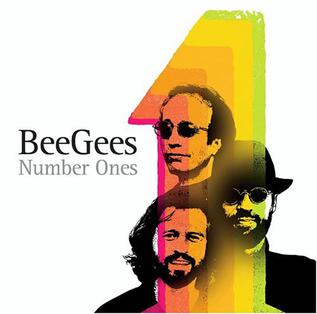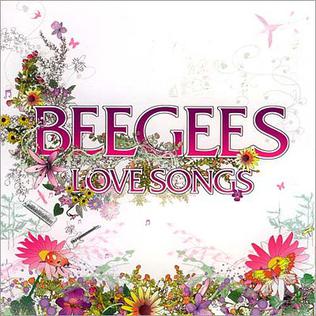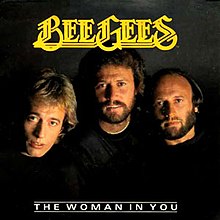
Saturday Night Fever is the soundtrack album from the 1977 film Saturday Night Fever starring John Travolta. The soundtrack was released on November 15, 1977. Prior to the release of Thriller by Michael Jackson, Saturday Night Fever was the best-selling album in music history, and still ranks among the best-selling soundtrack albums worldwide, with sales figures of over 40 million copies.

One Night Only is a live album and DVD/Blu-ray by the Bee Gees. It features the group's concert at the MGM Grand in Las Vegas in 1997 and includes many of their greatest hits.

Size Isn't Everything is the twentieth studio album by the Bee Gees, released in the UK on 13 September 1993, and the US on 2 November of the same year. The brothers abandoned the contemporary dance feel of the previous album High Civilization and went for what they would describe as "A return to our sound before Saturday Night Fever".

"Night Fever" is a song written and performed by the Bee Gees. It first appeared on the soundtrack to Saturday Night Fever on RSO Records. Producer Robert Stigwood wanted to call the film Saturday Night, but singer Robin Gibb expressed hesitation at the title. Stigwood liked the title Night Fever but was wary of marketing a movie with that name. The song bounded up the Billboard charts while the Bee Gees’ two previous hits from Saturday Night Fever soundtrack were still in the top ten. The record debuted on the Billboard Hot 100 Chart at #76, then leaped up 44 positions to #32. It then moved: 32–17–8–5–2–1. It remained at #1 for eight weeks, and ultimately spent 13 weeks in the top 10. For the first five weeks that "Night Fever" was at #1, "Stayin' Alive" was at #2. Also, for one week in March, Bee Gees related songs held five of the top positions on the Hot 100 chart, and more impressively, four of the top five positions, with "Night Fever" at the top of the list. The B-side of "Night Fever" was a live version of "Down the Road" taken from the Bee Gees 1977 album, Here at Last... Bee Gees... Live.

"Stayin' Alive" is a song written and performed by the Bee Gees from the Saturday Night Fever motion picture soundtrack. The song was released in 1977 as the second single from the Saturday Night Fever soundtrack. The band co-produced the song with Albhy Galuten and Karl Richardson. It is one of the Bee Gees' signature songs. In 2004, "Stayin' Alive" was placed at No. 189 on the list of Rolling Stone's 500 Greatest Songs of All Time. The 2021 updated Rolling Stone list of 500 Greatest Songs placed "Stayin' Alive" at No. 99. In 2004, it ranked No. 9 on AFI's 100 Years...100 Songs survey of top tunes in American cinema. In a UK television poll on ITV in December 2011 it was voted fifth in "The Nation's Favourite Bee Gees Song".

"Nights on Broadway" is a song by the Bee Gees from the Main Course album released in 1975. The second single released from the album, it immediately followed their number-one hit "Jive Talkin'". This track was credited to Barry, Robin and Maurice Gibb.

"Jive Talkin' " is a song by the Bee Gees, released as a single in May 1975 by RSO Records. This was the lead single from the album Main Course and hit number one on the Billboard Hot 100; it also reached the top-five on the UK Singles Chart in the middle of 1975. Largely recognised as the group's comeback song, it was their first US top-10 hit since "How Can You Mend a Broken Heart" (1971).

Spirits Having Flown is the fifteenth album released by the Bee Gees. It was the group's first album after their collaboration on the Saturday Night Fever soundtrack. The album's first three tracks were released as singles and all reached No. 1 in the US, giving the Bee Gees an unbroken run of six US chart-toppers in a one-year period and equaling a feat shared by Bing Crosby, Elvis Presley, and The Beatles. It was the first Bee Gees album to make the UK top 40 in ten years, as well as being their first and only UK No. 1 album. Spirits Having Flown also topped the charts in Australia, Canada, Germany, New Zealand, Sweden and the US. The album has sold more than 30 million copies worldwide, making it one of the best-selling albums of all time.

"Love You Inside Out" is a 1979 hit single by the Bee Gees from their album, Spirits Having Flown. It was their last chart-topping on the Billboard Hot 100, interrupting Donna Summer's "Hot Stuff", becoming the third single from the album to do so. In the UK, the single peaked at No. 13 for two weeks. It was the ninth and final number-one hit for the Bee Gees in the US, and the twelfth and final number-one hit in Canada as well. The trio would not return to the top 10 for ten years, with the song, "One".

"You Should Be Dancing" is a song by the Bee Gees, from the album Children of the World, released in 1976. It hit No. 1 for one week on the American Billboard Hot 100, No. 1 for seven weeks on the US Hot Dance Club Play chart, and in September the same year, reached No. 5 on the UK Singles Chart. The song also peaked at No. 4 on the Billboard Soul chart. It was this song that first launched the Bee Gees into disco. It was also the only track from the group to top the dance chart.

Their Greatest Hits: The Record is the career retrospective greatest hits album by the Bee Gees, released on UTV Records and Polydor in November 2001 as HDCD. The album includes 40 tracks spanning over 35 years of music. Four of the songs were new recordings of classic Gibb compositions originally recorded by other artists, including "Emotion", "Heartbreaker", "Islands in the Stream", and "Immortality". It also features the Barry Gibb duet with Barbra Streisand, "Guilty", which originally appeared on Streisand's 1980 album of the same name. It is currently out of print and has been supplanted by another compilation, The Ultimate Bee Gees.

The discography of musical group the Bee Gees consists of 39 albums and 83 singles. In a career spanning more than 50 years, the "Kings of Disco" have already sold over 220 million records worldwide, becoming among the best-selling music artists in history. Billboard ranked them as the 28th Greatest Artist[s] of All Time. According to RIAA, the Bee Gees have sold 28 million certified albums in the United States.

Number Ones is a compilation album by the Bee Gees released in 2004. It includes 18 of their greatest hits and a tribute to band member Maurice Gibb, who died in 2003. It is the final Bee Gees album released by Universal Records.

"How Deep Is Your Love" is a pop ballad written and recorded by the Bee Gees in 1977 and released as a single in September of that year. It was ultimately used as part of the soundtrack to the film Saturday Night Fever. It was a number-three hit in the United Kingdom and Australia. In the United States, it topped the Billboard Hot 100 on 25 December 1977 and stayed in the Top 10 for 17 weeks. It spent six weeks atop the US adult contemporary chart. It is listed at No. 27 on Billboard's All Time Top 100. Alongside "Stayin' Alive" and "Night Fever", it is one of the group's three tracks on the list. The song was covered by Take That for their 1996 Greatest Hits album, reaching No. 1 on the UK Singles Chart for three weeks.
"If I Can't Have You" is a disco song written by the Bee Gees in 1977. The song initially appeared on the Saturday Night Fever soundtrack in a version by Yvonne Elliman, released in November 1977. The Bee Gees' own version appeared a month later as the B-side of "Stayin' Alive".

"Immortality" is a pop song recorded by Canadian singer Celine Dion for her fifth English-language studio album, Let's Talk About Love (1997). It was written by the Bee Gees, who also recorded backing vocals. Produced by Walter Afanasieff, "Immortality" was released as a single on 5 June 1998, outside the United States. It became a top ten single in Europe and a top forty single in Canada and Australia. Later, "Immortality" was included on the international editions of Dion's greatest hits albums, All the Way... A Decade of Song (1999), My Love: Essential Collection (2008) and The Best So Far... 2018 Tour Edition (2018).

Greatest is a greatest hits album by British pop group Bee Gees. Released by RSO Records in October 1979, the album is a retrospective of the group's material from 1975 to 1979. A remastered and expanded version of the album was released by Reprise Records in 2007.

"More Than a Woman" is a song by musical group the Bee Gees, written by Barry, Robin, and Maurice Gibb for the soundtrack to the film Saturday Night Fever. It became a regular feature of the group's live sets from 1977 until Maurice Gibb's death in 2003 and was often coupled with "Night Fever".

Love Songs is the third Bee Gees compilation album in four years, though the first to cover a specific musical style. A proposed album of love songs was in the works around 1995 when the Bee Gees recorded their own versions of "Heartbreaker" and "Emotion", but that project was soon shelved and those recordings remained unavailable until the release of Their Greatest Hits: The Record in 2001.

The Ultimate Bee Gees is a compilation album released to coincide with the 50th anniversary of the Bee Gees. Although the group did not start recording until 1963 on Festival Records in Australia, they began calling themselves the "Bee Gees" in 1959 after several name changes such as "Wee Johnny Hayes and the Bluecats", "The Rattlesnakes" and "BG's". Each disc is themed with the first containing more upbeat songs, called A Night Out, and the second containing slower songs and ballads, called A Night In, though the cover art does not distinguish this theme. Liner notes were written by Sir Tim Rice. This also marks the return of the 1970s era logo on an official Bee Gees release, which was last used on the Bee Gees' 1983 single "Someone Belonging to Someone".


















